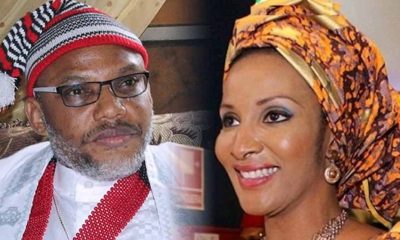News
CBN retains benchmark interest rate at 11.5%, says it will aid economic growth

The monetary policy committee of the Central Bank of Nigeria (CBN) has announced its decision to maintain the monetary policy rate (MPR), which measures interest rate, at 11.5 percent.
Addressing journalists on Friday after the committee’s two-day meeting at the CBN headquarters in Abuja, Godwin Emefiele, governor of the apex bank, said the committee applauded the fifth decreased in inflation in the month of August 2021.
According to Emefiele, the committee unanimously voted to maintain the key lending rate at 11.5 percent, with the asymmetric corridor of +100 and -700 basis points around the MPR.
The CBN MPC noted that holding stance would allow current recovery in output and decline inflation continue.
It urged the fiscal authority not to relent in its infrastructure initiatives, including diaspora bonds to increase investment in critical infrastructure.
On Wednesday, the National Bureau of Statistics (NBS) said the consumer price index (CPI), which measures the rate of change in prices of goods and services, declined for the fifth consecutive time to 17.01 percent in August from 17.38 recorded in July.
This rate is 0.37 percent points lower than 17.38 percent recorded last month.
Since March 2021, Nigeria’s inflation rate has been on downward trends as the Central Bank of Nigeria (CBN) projected it may drop to 13 percent this year and a single-digit rate by 2022.
On exchange rates, Emefiele said the committee also applauded the banks on meeting forex demands and that all demands must be necessarily conducted at the Importer and Exporter (I&E) window to ensure stability.
He said operators must adhere to stipulated guidelines as the apex bank strive to eliminate illegal fx dealers in the country.
News
I’m alive, Obasanjo reacts to death rumour

I’m alive, Obasanjo reacts to death rumour
Former President, Olusegun Obasanjo, has said he is alive, hale and hearty.
He stated this in reaction to rumours of his death being reportedly spread on some social media platforms.
He spoke in Osogbo, Osun State, during the inauguration of the Old-Garage/Oke-Fia Road reconstructed by Governor Ademola Adeleke.
Obasanjo said those who wanted him dead were spreading the rumour of his death on the social media.
He said, “I heard the rumour that I was dead. I saw it on the social media. I quickly told my children and my relations that it was not true and that I’m alive.
“Those that want me dead, that is their wish, but God still keeps me alive.”
Obasanjo praised Adeleke for his performance in Osun and charged the governor to keep up the work.
Governor Adeleke assured the people of the state that his administration would complete all the ongoing projects.
“My dear people of Osun State, our administration has constructed over 120 kilometres of roads across the state.
“Two major flyovers are also progressing to completion at Osogbo while work is progressing at the Ile Ife Flyover and Ilesa dualisation.”
News
Tinubu jets out to France on three-day visit

Tinubu jets out to France on three-day visit
President Bola Tinubu will travel to France today (Wednesday) for a three-day state visit at the instance of the French president.
A statement issued by the President’s Special Adviser on Information and Strategy, Bayo Onanuga, confirmed this.
It said, “The Nigerian leader’s three-day visit, which will focus on strengthening political, economic, and cultural relations and establishing more opportunities for partnership, particularly in agriculture, security, education, health, youth engagement and employment, innovation, and energy transition, promises significant benefits for Nigeria.”
Onanuga said Tinubu and Macron would harmonise positions on stimulating more interest in exchange programmes that focus on skill development for youths and improving their competencies in automation, entrepreneurship, innovation, and leadership.
“Both leaders will participate in political and diplomatic meetings highlighting shared values on finance, solid minerals, trade and investments, and communication,” he added.
“They will also witness a session by the France-Nigeria Business Council, which oversees private sector participation in economic development.”
The presidential adviser stated that the Nigerian first lady and her French counterpart would discuss solutions for empowering women, children, and the most vulnerable through the Renewed Hope initiative.
News
Yahaya Bello reports to EFCC office with lawyers

Yahaya Bello reports to EFCC office with lawyers
A former Governor of Kogi State, Yahaya Bello, on Tuesday visited the Economic and Financial Crimes Commission (EFCC) to honour another invitation extended to him over alleged misappropriation of funds.
Bello went to the anti-graft office with his lawyers in the morning.
The ex-Kogi governor reportedly drove himself to the EFCC’s office in a black Toyota Hilux van with some lawyers.
He was said to have been taken by some operatives of the agency and are currently being grilled.
This is coming after the Supreme Court judgment which dismissed a suit brought by some state governments challenging the constitutionality of the agency.
The EFCC at the last hearing on November 14, sought the adjournment till November 27 in the fresh case it instituted against Bello.
It stated that the 30-day window was still running for the summons earlier issued.
-

 metro1 day ago
metro1 day agoBREAKING: Port Harcourt refinery begins operation
-

 Sports1 day ago
Sports1 day agoFrench football star, Paul Pogba’s blackmail trial begin in Paris
-

 Politics2 days ago
Politics2 days agoLagos 2027: Seyi Tinubu campaign team releases his life documentary
-

 Entertainment2 days ago
Entertainment2 days agoPolygamy best form of marriage for Africa – Okey Bakassi
-

 metro2 days ago
metro2 days ago40-foot container falls on car in Lagos
-

 International2 days ago
International2 days agoTrump to sack 15,000 transgender officers from U.S. military: Report
-

 Education1 day ago
Education1 day agoUS University opens 2025 scholarships for international students
-

 metro11 hours ago
metro11 hours agoBianca raises hope Tinubu will free Nnamdi Kanu to restore peace in South-East


